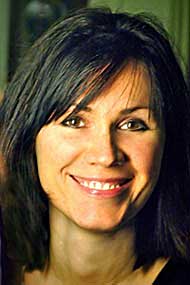What is creativity? How does it occur? How do attention, cognitive control, motivation, personality and biology influence it?

Darya Zabelina, a National Science Foundation graduate research fellow at Northwestern University, applies perspectives ranging from cognitive neuroscience to social psychology while attempting to answer those questions.
Zabelina presents “Leaky Attention and Creativity: Behavioral, EEG and fMRI Evidence,” Wednesday, Feb. 17 at 7 p.m. in the Wriston Art Center auditorium as part of Lawrence University’s The Liberal Arts in the Century of the Brain series. A question-and-answer session follows the presentation, which is free and open to the public.
With a focus on ways of enhancing and fostering the development of creative thinking and problem-solving abilities, Zabelina’s research has shown some people are more sensitive to sensory input than others.
“We find that people with real-world creative achievements are less likely to filter out sound than their less creative counterparts,” Zabelina wrote for “The Creative Post” blog. “Additionally, they do it involuntarily, as this happens very early in the processing stream—only 50 ms (miliseconds) after the onset of the sound.”
This “leaky” attention is a two-way street according to Zabelina. Extra sensory input can be distracting to people, but it also may result in processing ideas that lead to more creative thinking.
Zabelina earned bachelor and master’s degrees in psychology from North Dakota State University and her Ph.D. in psychology from Northwestern.
The Liberal Arts in the Century of the Brain series incorporates the interdisciplinary areas of neuroscience and cognitive science to create connections with other disciplines at Lawrence.
The remaining speakers on the series include:
- John Iverson, associate project scientist at University of California-San Diego’s Institute for Neural Computation. February, 24. A cognitive neuroscientist, Iverson will discuss his research on rhythm perception and production in music and language, work that spans behavioral and neuroscience approaches. He is currently overseeing a study of the effect of music training on children’s brain and cognitive development.
- Walter Sinnott-Armstrong, Chauncey Stillman Professor of Practical Ethics in the department of philosophy and the Kenan Institute for Ethics at Duke University. April 12. The author of five books and more than 100 published articles, Sinnott-Armstrong is a scholar of moral psychology and brain science, which his presentation will focus on, as well as uses of neuroscience in the legal system.
About Lawrence University
Founded in 1847, Lawrence University uniquely integrates a college of liberal arts and sciences with a nationally recognized conservatory of music, both devoted exclusively to undergraduate education. It was selected for inclusion in the book “Colleges That Change Lives: 40 Schools That Will Change the Way You Think About College” and Fiske’s Guide to Colleges 2016. Engaged learning, the development of multiple interests and community outreach are central to the Lawrence experience. Lawrence draws its 1,500 students from nearly every state and more than 50 countries.